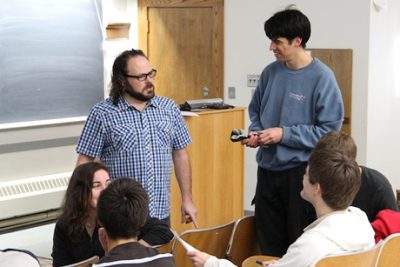New project ‘flips’ the teaching of science

Jed Sparks, associate professor of ecology and evolutionary biology, left, uses “deliberate practice” during an advanced ecology class with Eric Gulson '14.
~July 16, 2013~
A new five-year pilot project in the College of Arts and Sciences will help science professors teach students at Cornell in new and exciting ways. The project will implement the “flipped classroom” model advocated by Nobel laureate Carl Wieman.
Traditional lectures are designed to transfer knowledge from teacher to student. In the flipped classroom model, that transfer occurs via homework assignments outside the classroom. Class time focuses on applying the new knowledge via problem-solving and reasoning practice to give students experience making and testing predictions and solving problems. Recent research shows that the extent to which students engage in deliberate practice is more important to their ultimate success than their initial interest or talent for a subject.
Another key component of this new approach to teaching is rigorous assessments of what students actually learn, built into the course in an integral way. So called “deliberate practice” includes feedback from the teacher and fellow classmates, so that students learn to critique their own reasoning and think about problems the way an expert would. The peer interaction forces students to explain their thinking and to consider other points of view, helping them integrate new information.


